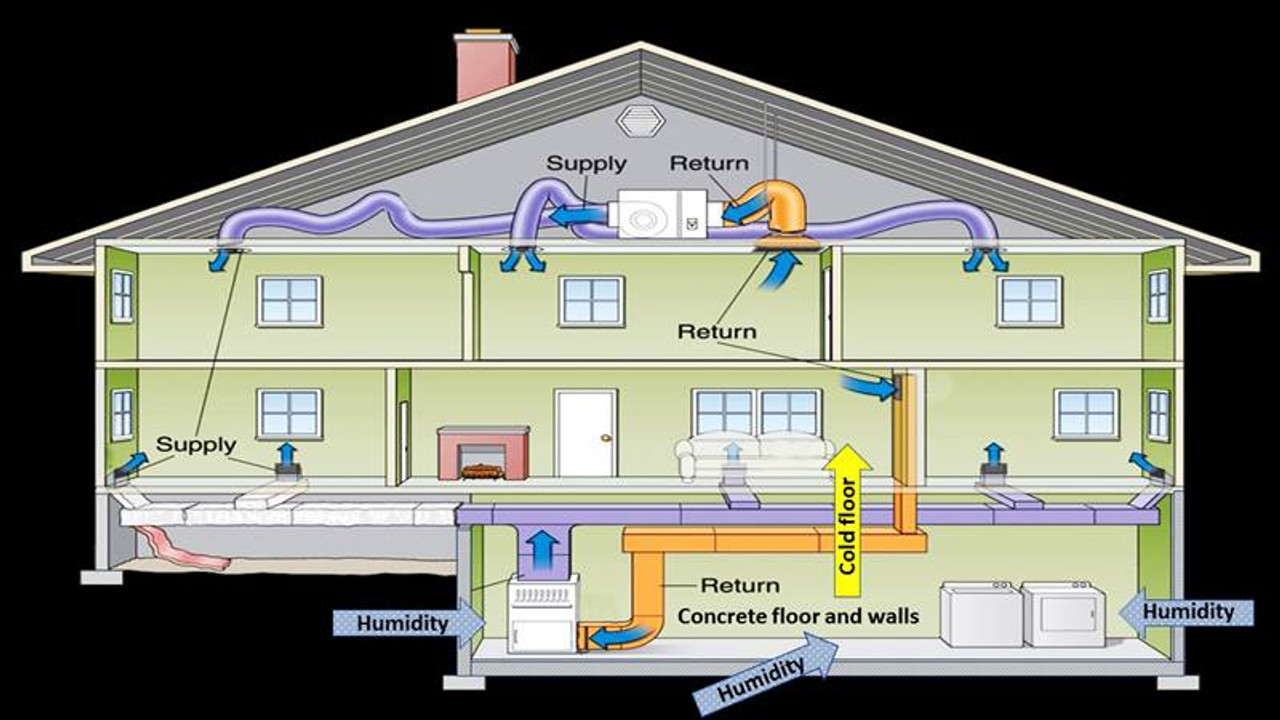What if I told you one simple and relatively inexpensive thing you could do to your basement to save money, save energy, provide better air quality for you and your family, provide a warmer environment, reduce the chance of mold growth, and increase the life of any flooring you put down? Would you be interested? Would you be surprised to learn that by sealing your concrete walls and floor, you can accomplish all these things plus more.
Most energy saving efforts for homes are focused on the upper part of the home (above grade). Many energy saving ideas such as more insulation, new doors or windows, energy efficient appliances, weather stripping, insulating heat ducts or the water heater, sealing air gaps between the outside and the inside are often suggested. No one seems to consider what can be done in the basement to make not only the basement but the entire home warmer. If the basement is warmer, the entire house will be warmer.
Cold air enters your home as humidity from the ground outside and moves through your concrete walls or the concrete floor into the basement. Humidity travels from wet to dry and from cold to warm environments so your warm dry basement sucks the humidity from the wet, cold earth bringing cold, humid air into your home. Many people use a dehumidifier to dry the air and thus warm up the room. However, a dehumidifier creates an endless cycle of pulling cold, humid air through the concrete and into the room. Energy is consumed running the dehumidifier as well as trying to warm up the cold air that is continually being pulled into your basement.
Humidity affects our homes because it increases the amount of work that an air conditioner or furnace has to do to dry and cool the air in the summer or to dry and heat the air in the winter. Air conditioning systems work by removing humidity from the air inside your home. Removing humidity from the air cools the air in the summer and heats the air in the winter. The air with the humidity removed is then moved throughout your home.
Humidity creates dusty conditions or efflorescence by pulling the salts and chemicals out of the concrete as it passes through. This dust or efflorescence can affect our health adversely and destroy flooring products such as carpeting. Humidity under tile can destroy the glue allowing the tile to bubble and eventually pop off.
Humidity also creates an excellent environment for mold and mildew growth. Items stored in the basement can absorb the humidity and be ruined by mold or mildew. Carpet padding is also another excellent area for mold and mildew growth.
Basements collect more humidity than any other part of the home. Not only is the concrete floor exposed to humidity from the ground, but the walls are also. One out of four basements have an above average humidity reading. Basements with high humidity can reduce the AC performance up to 15%. Consider what a huge amount of energy it would save to increase the AC efficiency by 15%. Therefore, reducing humidity in basements becomes of paramount importance to save energy over the long-term.
How does sealing the basement walls and floor before finishing your basement save you money? When you finish your basement and the air warms up even more, the warm, dry air pulls even more humidity and cold air from the earth surrounding the basement. Using a dehumidifier creates a continuous cycle of humidity and cold air being pulled into the room. A floor covered with carpet creates an ideal environment for the growth of mold under the carpet, Hardwood floors can warp and tile can pop off. It is much more expensive to try and stop humidity after the basement is finished.
Sealing the walls and floors will mitigate humidity which increases AC performance and reduces electricity costs. You will not need to run a dehumidifier. Floor coverings such as carpet, tile, and hardwood will last longer and your valuable possessions will not be at risk of mold or mildew. Your environment will be healthier with no efflorescence or concrete dusting. And your concrete walls and floor will not be damaged by moisture vapor transfer.
So before you move into your home or at least as soon as you read this article and definitely before you start to finish your basement - take the time and small investment to seal your concrete walls and floor. You will be so glad you did. You will save money, save energy, and insure better health to you and your family.
More Information:
How to Seal your Basement walls and floor video - https://youtu.be/XJxUGcLLtok
Recommended product to seal walls - SealGreen Concrete Sealer Concentrate
Recommended sealer for concrete floors - SealGreen E10 Epoxy Sealer

